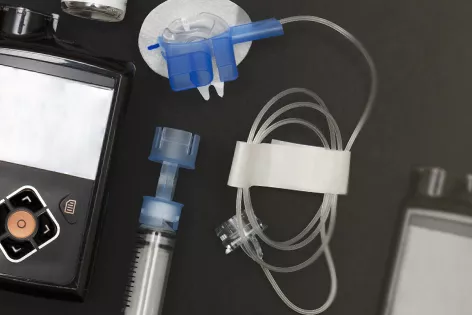
Case Overview
In November 2019, medical device company Medtronic recalled its MiniMed™ 600 series insulin pumps. In February 2020, the FDA issued a Class I recall for the insulin pumps due to problems with the pumps’ clear reservoir retainer rings. The FDA found a reasonable probability the pumps would cause serious adverse health consequences or death in users.
What is the Medtronic MiniMed insulin pump?
Medtronic’s MiniMed insulin pumps are supposed to help diabetic patients regulate their blood sugar levels by delivering insulin on a programmed schedule and keeping their blood sugar stabilized. MiniMed devices were designed to be used by both type 1 and type 2 diabetes patients and hold patients’ insulin cartridges in place with reservoir retainer rings.
Defective insulin pumps can cause serious and life-threatening health problems. Receiving incorrect insulin doses can cause seizures, diabetic comas, or death for diabetic patients.
MiniMed insulin pump defect led to injury, lawsuits
In November 2019, Medtronic recalled its 600 series MiniMed insulin pumps. The recall came after users of the MiniMed 600 models reported issues with the devices’ clear retainer rings. Problems with the defective retainer rings led to improper insulin dosing.
What are the problems with MiniMed 600 insulin pumps?
MiniMed 600 series insulin pumps use a clear retainer ring to lock the insulin reservoir to the pump mechanism. This ring can be broken or damaged, causing patients to receive too much or too little insulin. Problems have been reported with the black retainer rings as well.
Too much or too little insulin delivery can result in hypoglycemia or hyperglycemia.
- Severe hypoglycemia, or low blood sugar, can lead to loss of consciousness, seizures or death.
- Severe hyperglycemia, or high blood sugar, can lead to loss of consciousness, organ damage or death.
MiniMed insulin pumps involved in clear defective retainer ring recall
Insulin Pump | Model Numbers | Distribution Details |
|---|---|---|
MMT-1510 | Not distributed in the U.S.* | |
MMT-1515 | Distributed and sold in the U.S. from September 2016 – October 2019 | |
MMT-1511 | Not distributed in the U.S.* | |
MMT-1580 | Distributed and sold in the U.S. from June 2017 – August 2019 |
*We are not interested in non-U.S. claims.
What to do if you have a MiniMed 600 Series insulin pump
Medtronic recommends that patients using the 600 series pumps inspect their devices for the clear retainer ring. The ring may be damaged, broken, missing or intact. If there is a clear ring, the company will replace the pump. If you experienced any medical problems as a result of your use of the pump, it is important to keep and maintain the old pump.
Patients using the MiniMed 600 series insulin pumps should not stop using or change their insulin pump without consulting their doctor first.
Medtronic MiniMed insulin pump recall timeline
Medtronic’s MiniMed 600 series insulin pumps have been involved in several recalls, including the one concerning the retainer ring.
After Medtronic initiated its November 2019 recall, the FDA issued a Class I recall in February 2020. Class I recalls are the most serious FDA product notice. These recalls are issued when there is “reasonable probability” using a product may cause serious health issues or death.
The Medtronic insulin pump recall affects 322,005 MiniMed devices in the U.S. and 481,875 devices worldwide.
The MiniMed insulin pumps have also been subject to several Class II recalls. Class II recalls are issued when a product may cause “temporary or medically reversible adverse health consequences.”
Complete timeline of all Medtronic recalls affecting MiniMed 600 series insulin pumps
- December 2015: The FDA issued a Class II recall of the MiniMed model 640G and 620G insulin pumps. The pumps’ drive motors would malfunction, resulting in an error message alarm. The recall was terminated February 2016.
- April 2017: The FDA issued a Class II recall of MiniMed model 620G and 640G insulin pumps with software version 2.6 or earlier. These pumps had a software bug that prevented the battery from charging, leading to pump shutdown. The recall was terminated May 2017.
- December 2018: The FDA issued a Class II recall of MiniMed model 630G, 640G and 670G insulin pumps with software version 4.1. A software issue causes the pumps to fail to make programmed audio notification sounds, including those indicating high or low blood sugar levels. The recall is still open.
- July 2019: The FDA issued a Class II recall of all MiniMed 600 series insulin pumps. The insulin pumps’ keypads could become stuck and unresponsive. The recall was terminated January 2021.
- February 2020: The FDA issued a Class I recall of all MiniMed 600 series insulin pumps because the defective retainer ring cause unregulated insulin delivery. The recall is still open.
- December 2020: The FDA issued a Class II recall of MiniMed model 630G, 640G and 670G insulin pumps. The pumps do not have a solder connection around the battery, which can lead to power interruption. The recall is still open.
- June 2021: The FDA issued a Class II recall of MiniMed model 670G insulin pumps for a software defect that may lead to the over delivery of insulin. The recall is still open.
- July 2022: The FDA issued a Class II recall of all MiniMed 600 series insulin pumps. The pumps’ battery cap can deteriorate causing power loss. The recall is still open.
- November 2022: The FDA issued a Class II recall of all MiniMed 600 series insulin pumps. Medtronic found a security issue with the pumps that could allow unauthorized users to access the pumps and program improper doses of insulin. The recall is still open.
Who is eligible to file a claim concerning their MiniMed 600 insulin pump retainer ring?
Diabetes patients who used the MiniMed 600 series insulin pumps with clear retainer rings and experienced complications may be able to bring a claim. Product liability lawsuits allow people to seek to hold companies that manufacture defective insulin pumps responsible for causing harm. Our product liability lawyers help the victims of defective products obtain justice.
Health problems caused by defective MiniMed insulin pumps
Reports from 2020 show Medtronic has received more than 26,400 complaints about the MiniMed 600’s retainer rings. The complaints include records of at least 2,175 injuries and one death, according to the company.
However, Medtronic’s voluntary recall notice states “serious injuries and deaths have been reported … but have not been directly correlated with damaged clear retainer rings.”
Patients who used the MiniMed 600 insulin devices may have had complications from improper insulin dosing. Over or under delivery of insulin can cause minor and severe side effects.
Side effects related to high blood sugar (hyperglycemia) from too little insulin include:
- Abdominal pain
- Blurred vision
- Confusion and disorientation
- Dehydration
- Fatigue
- Frequent urination
- Fruity-smelling breath
- Headache
- Increased thirst or hunger
- Ketoacidosis
- Labored breathing
- Loss of consciousness
- Nausea and vomiting
- Rapid heartbeat
- Skin infections
- Slow-healing cuts and sores
- Unexplained weight loss
- Vaginal yeast infections
Side effects related to low blood sugar (hypoglycemia) from too much insulin include:
- Anxiety or irritability
- Blurred or double vision
- Clumsiness or difficulty with coordination
- Confusion, trouble concentrating or disorientation
- Death
- Diabetic coma
- Dizziness or lightheadedness
- Extreme hunger
- Faster heart rate
- Loss of consciousness
- Pallor
- Seizures
- Shaking or trembling
- Slurred speech
- Sweating and chills
- Tingling or numbness
- Weakness
MiniMed insulin pump settlements and other recoveries
Patients who used the MiniMed 600 series insulin pumps and have injuries may have viable claims against Medtronic. If you experienced health problems related to hyperglycemia or hypoglycemia you believe your defective MiniMed pump caused, you may be able to receive compensation.
Our lawyers can help you determine whether you are eligible to bring a lawsuit. If you file a lawsuit, you may receive compensation through a settlement or verdict.
Our diabetes litigation experience
Our attorneys have experience representing diabetics in insulin pump cases, including representing clients with other models of Medtronic insulin pumps that over and undelivered insulin.
We understand the toll insulin pump problems can take on a diabetes patient.
We have investigated and litigated cases for diabetics who experienced complications from various diabetes medications. This includes medical drug lawsuits over:
- Actos® and Duetact® (which have been linked to an increased risk of developing bladder cancer)
- Incretin mimetics Januvia®, Victoza®, Janumet® and Byetta® (which are linked to pancreatic cancer)
- SGLT2 Inhibitors Invokana®, Invokamet®, Farxiga®, Xigduo XR®, Jardiance®, Glyxambi® and Synjardy® (which allegedly increased the risk of kidney failure)
Our attorneys have the resources to thoroughly investigate harmful products, medical causation, compliance with FDA regulations, inadequate warnings, wrongdoing and other issues in medical products lawsuits.
If you used a Medtronic MiniMed pump and suffered health problems, we can help you seek compensation for the harms you have suffered. Contact us today to learn about your legal options.
Do not stop taking a prescribed medication without first consulting with your doctor. Discontinuing a prescribed medication without your doctor’s advice can result in injury or death.
Motley Rice LLC, a South Carolina Limited Liability Company, is engaged in the New Jersey practice of law through Motley Rice New Jersey LLC. Esther Berezofsky is the attorney responsible for the New Jersey practice.
Start Your Motley Rice Consultation in Simple Steps
Submit Information
Call us or fill out our online form with the details of your potential case.
Case Review
Our team reviews your information to assess your potential case.
Case Consultation
Talk with us about next steps.

